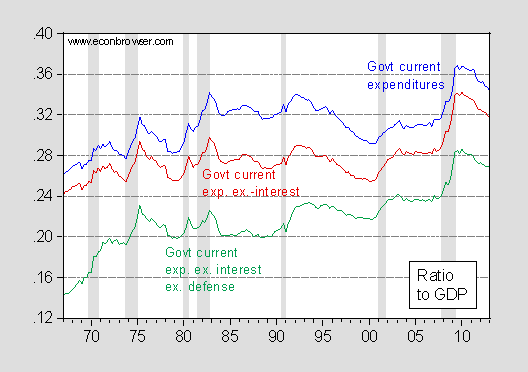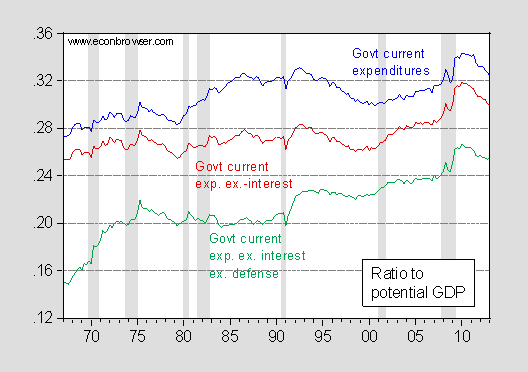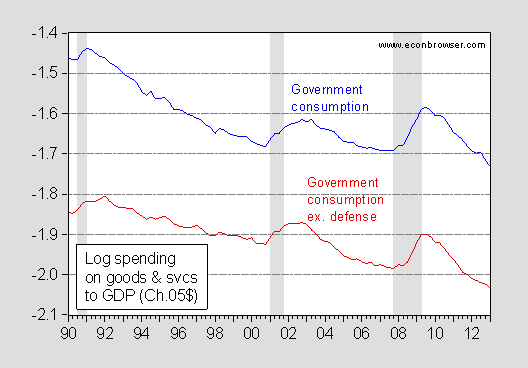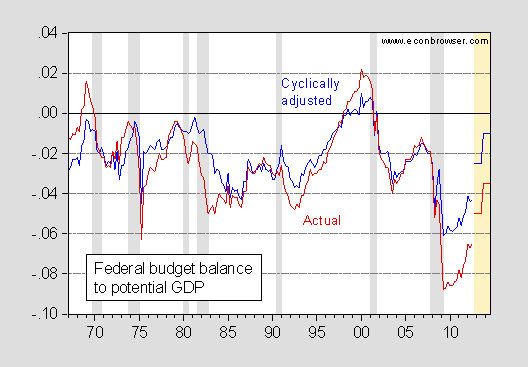And a slightly older message from the CBO.
I’m late to the game [1], but it bears repeating: according to the BEA, government spending (either on goods and services, or more broadly including transfers) is declining as a share of GDP.

Figure 1: Government current expenditures (blue), ex.-interest (red) and ex.-interest ex.-defense consumption and investment (green) as a share of GDP. NBER defined recession dates shaded gray. Source: BEA, 2013Q1 advance release, NBER and authors calculations.
The drop is more pronounced if one accounts for the fact that GDP is at depressed levels relative to potential GDP. This is shown in Figure 2.

Figure 2: Government current expenditures (blue), ex.-interest (red) and ex.-interest ex.-defense consumption and investment (green) as a share of potential GDP. NBER defined recession dates shaded gray. Source: BEA, 2013Q1 advance release, CBO, Budget and Economic Outlook, February 2013, NBER and authors calculations.
Government consumption and investment is also declining in real terms, relative to GDP (keeping in mind Jim’s observation that total spending is relatively high, as shown in Figure 2). This decline is shown in Figure 3.

Figure 3: Log real government spending on goods and services (blue), and ex.-defense (red) as a log ratio of real GDP. NBER defined recession dates shaded gray. Source: BEA, 2013Q1 advance release, NBER and authors calculations.
Finally, it is important to recall that what matters for the pace of debt accumulation is the deficit. The actual and cyclically adjusted budget balance to potential GDP ratio is rapidly increasing, as shown in Figure 4.

Figure 4: Federal budget balance (red) and cyclically adjusted (blue) to potential GDP. Projections under current law for budget balance (bold red), and for cyclically adjusted (bold blue). NBER recession dates shaded gray; forecast period shaded tan. Source: CBO and NBER.
In other words, the fiscal impulse is rapidly dissipating. And it’s doing so against a backdrop of slowing growth in Europe — even Germany[2] — and in China [3]. Whether US growth can be sustained in such a global environment is an open question in my mind, given Macroeconomic Advisers’ estimate of 1.4 ppts sequester-related deduction from (annualized) growth in 2013Q2.
Menzie,
If government spending is decreasing how do you account for the declining unemployment and the “green shoots” of recovery?
Ricardo-
Menzie’s point is that austerity is working here.
Anonymous says, “Menzie’s point is that austerity is working here.”
I don’t think that’s Menzie’s point at all, so hopefully he’ll clarify. The US had a period of moderate (not strong) stimulus– largely through a rise in transfer payments like unemployment and Medicaid– for a couple of years. Since then, government expenditures have turned moderately contractionary. GDP has risen, but stayed well below potential.
In Europe, by contrast, there has been austerity– by which is meant reducing spending on things that people need to prop up the banks. Where it has been harsh, such as in Greece and Ireland, the economies are in various levels of crisis. In places that refused to do it, like Iceland, the economy is doing well. Other countries are in the middle.
While one can argue about exactly how much austerity is too much, that’s probably the wrong question. The right question is whether government is spending on things likely to prevent GDP from declining further and/or to cause it to rise in the future.
Looking at figure 2, which I prefer because it adjusts for the cyclical behavior of GDP, government spending excluding defense and interest is still higher than it was in the ’80’s, ’90’s, and even the ’00’s. That suggests to me that the scope of government is still too large and may be impeding the private sector. Of course, massive cuts to government spending all at once would be painful, but I think a medium-term plan to scale back government consumption is called for.
Otherwise, the onus is on others to explain what I, as a typical employed, upper-middle-class American am getting from the government now that wasn’t available in the ’80’s. The increase isn’t all due to demographics and increased expenditures related to old people, is it?
Anonymous, Ricardo,
Not so fast, don’t underestimate the impact that Cash for Clunkers had on long run growth.
Ricardo: I guess you live in a bivariate world. Except when QE doesn’t correlate with rising gold prices. Then it’s bivariate with long and variable (and indescribable) lags.
Charles II: You are right, but Ricardo is being willfully obtuse. The point is that Europe is implementing earlier more rapid spending cuts and tax increases than the US, and is hence going into recession. The US is implementing similar cuts and tax increases, which depress growth for little gain in reduction in sovereign debt yields. So…wherefore austerity?
As I see it now, the end of the recovery is in sight and we didn’t make it back to a healthy economy. We will fall into a recession within 16 months … sick economy and all.
Menzie And exactly how do you supporting the claim that U.S. growth has been depressed? Is certainly can’t be 2.5% GDP growth and 3.2% consumption growth in conjunction with the $120B increase in payroll taxes and maybe $50B or so in new health care taxes. So much for state-contingent multipliers. Or are we back to fact-free analysis?
Jeff, Menzie’s statement that GDP growth is well below potential is hardly controversial. Before accusing someone of fact-free analysis, perhaps you could avoid knowledge-free comments?
Charles II: When evaluating the effectiveness of a change in policy, the relevant question is what is the resulting change in output—not what is the current level of output. Want to try again?
Charles II: Tell me, how does an article written in 2012 support the point that GDP growth has slowed in 2013?
Jeff, I never try three times with someone who is willfully misrepresenting his own statements. The “claim that U.S. growth has been depressed” is entirely supported by a comparison of GDP to potential GDP.
Anonymous, your comment (“how does an article written in 2012 support the point that GDP growth has slowed in 2013”) makes no sense. Growth appears to be slowing in 2013. In searching for causes for that slowing, one generally looks for, um, causally-linked factors. Causal factors generally occur prior to the event.
Unless one is a Republican, in which case time travel explains everything.
Anon,
Interesting comment. So you believe that Menzie is supporting a policy of austerity? How curious!
Ricardo
It was a joke, as even a 50% in real govt spending would be austerity to our beloved Menzie. But yes, it seems overall Govt real spending on goods and services is down, and austerity is working. I know we are all SHOCKED JUST SHOCKED that transfer payments are crowding out govt spending and investment in the lib panacia of “infrastructure.”
Charles II
“Potential GDP” is a made up number. Sure it is widely accepted, but in reality, nobody really knows what GDP potentially could be. I’d say we’re much further under it than most think.
Charles II: I don’t think you fully understand what the article says nor understand what I am saying. Let me help you out. My point was that it is the claim GDP growth was depressed in 2013.Q1 is either wrong, or at best, unsupported. The article you point two says basically says two things, (1) the level of (2012) GDP is below potential and (2) trend growth of GDP appears to declining. With respect to (1) I agree with the statement but repeat, it’s not relevant to the question at hand. Besides the date issue, the main point is that comparing the current level of GDP to potential tells you nothing about the growth rate of GDP, thus is does nothing to support the point that GDP growth is depressed in 2013.Q1. With respect to (2), I again agree with the statement but this fact only helps to support my point because it lowers the bar by which we judge 2013.Q1 growth to be above or below normal.
Finally, the timing issue is absolutely relevant if one is going to take the position, which Menzie has been taking, that the 2013 tax increases are going to dampen 2013 growth. So I suggest you re-read the article and what I said and spend a little more time trying to digest it.
Anon,
I got the joke. I just couldn’t resis the irony!
Jeff: Most of the contractionary impact was slated to strike in 2013Q2 according to Macroeconomic Advisers (linked to in the post), so 2013Q1 fiscal drag due to the sequester and end of payroll tax reduction should be fairly small (the numbers you cite are I believe annualized). So, truthfully, I don’t know what you’re talking about, given there are multiple shocks in the world.
Irony indeed. Ricardo (in his DickF incarnation) is still looking for WMDs in Iraq, and the link between Saddam Hussein and Al Qaeda. Anytime he writes is time for a good laugh on my part. Thanks again, Ricardo!
Come on Menzie. You know that the WMDs (chemical weapons) were sent from Iraq to Syria. They are getting use right now.
Menzie: There is so much wrong in what you wrote. In just two sentence no less, I am impressed! Let me try and unpack the errors. First, I was referring to the payroll tax cuts which took effect January 1. The MA post you cited looked at the effect of the March 1 sequester. Thus its not surprising MA predicts a heavier effect in Q2. But if you want to talk about the sequester too, that only reinforces my point. Second, I truly enjoyed the irony of you relying on the “multiple shocks” line when the facts don’t support your claims but in other instances are all too happy to make definitely statements based upon a single graph or chart. Yes, Menzie, there are multiple shocks in the world and as long as you remember that you can continue to make certain but unverifiable statements.